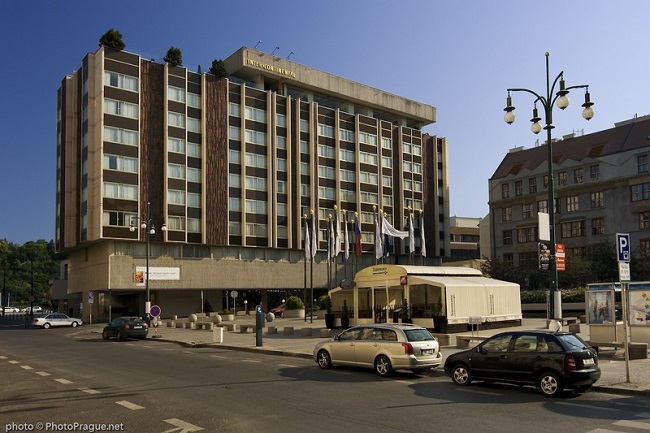
The Ministry of Culture is assessing the potential heritage protection of the Intercontinental
 |
Prague – The Ministry of Culture (MK) is considering the potential heritage protection of the Prague Intercontinental Hotel. The proceedings, which have been ongoing for several months, were initiated by officials five years after they received a proposal to declare the building as a monument. The hotel was acquired last year by the R2G fund. The process is still ongoing, and the ministry is gathering evidence, particularly needing to address the extensive statements from the owner, who is a participant in the proceedings, Iva Awwadová from the MK press department told ČTK. According to her, the outcome and the duration of the proceedings cannot be anticipated, as it is unclear what other steps the MK will have to take or whether the participant in the proceedings will take any.
The Intercontinental Hotel was built in the brutalist style between 1968 and 1975 in collaboration with three architectural collectives led by Karel Filsak. The building is already subject to heritage protection because it is located within a heritage reserve, and also because proceedings have already been initiated, thus the object is automatically protected. The National Heritage Institute (NPÚ) lists unique solutions, its location in the historical core of the city, the preserved exterior, and interior elements as the heritage values of the building on its website.
The proposal to declare the hotel a cultural monument was submitted five years ago by NPÚ, but according to Petra Hrušová from the ministry press department, no proceedings were initiated at that time. That only happened now. "The ministry initiated the proceedings in February of this year after a professional publication titled Hotel Intercontinental in Prague was released," she stated.
In January, the hotel was purchased from the Slovak group Best Hotel Properties by the R2G fund controlled by Oldřich Šlemr, Pavel Baudiš, and Eduard Kučera. The new owners then changed the name of the hotel to Golden Prague Hotel. The owners prepared a project for renovations of both the hotel’s interior and its surroundings, including the construction of a glass structure at the corner of Pařížská and Bílkovy streets on the piazzetta, which also belongs to the hotel and which the city has named after Miloš Forman. The possibility of construction on the piazzetta previously faced resistance from experts and the public.
Jakub Dyba, director of new investments at the R2G investment office, told ČTK today that the company is cooperating with the ministry. "We perceive broad support from both professional and lay public, the City of Prague, and the Prague 1 municipal district for our project. We are very concerned about information that individuals with private interests are trying to intervene in the proceedings conducted by the Ministry of Culture. We firmly believe that the Ministry of Culture will base its decisions on the opinions of professional organizations, which it has had available in the proceedings for a long time, and will not be influenced by any private interests," he stated.
Dyba added that the ministry’s committee in 2016 evaluated the heritage value of the hotel as insufficient to initiate proceedings for its declaration as a cultural monument. "The proceedings initiated by the ministry in February of this year are based on an old proposal that the ministry has already assessed once, so one must ask why," he said.
In February, during the launch of the book about the hotel, Šlemr stated that they bought the hotel also because they value it from an architectural and artistic perspective and that they want it to be preserved as is. He added that he would not mind and would even welcome heritage protection for the building.
Proceedings on declaring buildings from the second half of the 20th century, to which the hotel in the Old Town belongs, usually take years. These are buildings that experts often consider valuable as documentation of the period in question; however, their owners often want to remodel them for different purposes or even demolish them. This is the case for the Transgas complex, the Prague hotel, or the Ještěd department store in Liberec.
Conversely, in Prague, the Máj and Kotva department stores, the former Federal Assembly, the Institute of Macromolecular Chemistry, Expo Pavilion, and the International Hotel have been declared cultural monuments. The MK has had proposals for declaring houses constructed during the completion of the National Theatre, including the New Stage, pending for several years. The verdict will be significant as the theatre is planning their reconstruction.
The MK is also awaiting the initiation of proceedings for the Strojimport, Centrotex, planetarium, crematorium in Motol, student dormitories in Podolí, and Větrník buildings. Last year, the ministry declared the ČVUT dormitories in Podolí, which are expressions of the Sorel style and were built in 1953, as a monument. The press department of ČTK has now reported that proceedings have only been initiated for the planetarium among these buildings. "Proceedings are also ongoing in several other cases of buildings from the second half of the 20th century, such as the swimming complex in Podolí," the MK stated.
The English translation is powered by AI tool. Switch to Czech to view the original text source.
0 comments
add comment
Related articles
6
10.02.2021 | Praha 1 will prepare objections to the modification of the surroundings of the Intercontinental hotel
4
09.02.2021 | Hotel Intercontinental is not a monument, the ministry has decided
3
09.02.2021 | Hotel InterContinental was the first five-star hotel in the country
0
08.02.2021 | Prague councilors rejected the construction near the Intercontinental hotel
0
22.01.2021 | Prague did not approve the objection to the construction near the Intercontinental hotel
0
12.10.2020 | Investor reduced the design of the building near the Intercontinental by two floors
95
06.02.2020 | NPÚ published a book about the Prague Intercontinental Hotel
0
07.11.2019 | The area around the Prague Intercontinental Hotel is undergoing a significant transformation








